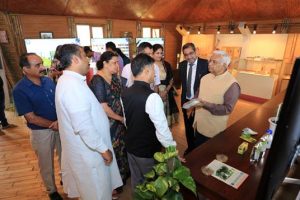 CSIR-National Institute of Science Communication & Policy Research (CSIR-NIPR), Unnat Bharat Abhiyan (UBA) and Vijnana Bharati (VIBHA) have jointly undertaken a major initiative for the dissemination of CSIR technologies to create livelihood opportunities in rural areas. In this context, CSIR-NIScPR, CSIR-IHBT, UBA and VIBHA jointly organized a tow-days ‘Technology Demonstration and Networking Meet’ on 29-30 June 2022 at CSIR-IHBT, Palampur. The key objective of this Meet was to showcase and demonstrate rural technologies developed by CSIR-IHBT that can help in farmers’ livelihood creation and enhance their income through the development of business opportunities. The meet brought scientists, researchers, investigators, Regional Coordinating Institutes (RCIs) and Participating Institutions (PIs) of UBA, SHGs, FPOs, and village communities together on a single platform to discuss opportunities as well as challenges in the successful translation of the identified technologies.
CSIR-National Institute of Science Communication & Policy Research (CSIR-NIPR), Unnat Bharat Abhiyan (UBA) and Vijnana Bharati (VIBHA) have jointly undertaken a major initiative for the dissemination of CSIR technologies to create livelihood opportunities in rural areas. In this context, CSIR-NIScPR, CSIR-IHBT, UBA and VIBHA jointly organized a tow-days ‘Technology Demonstration and Networking Meet’ on 29-30 June 2022 at CSIR-IHBT, Palampur. The key objective of this Meet was to showcase and demonstrate rural technologies developed by CSIR-IHBT that can help in farmers’ livelihood creation and enhance their income through the development of business opportunities. The meet brought scientists, researchers, investigators, Regional Coordinating Institutes (RCIs) and Participating Institutions (PIs) of UBA, SHGs, FPOs, and village communities together on a single platform to discuss opportunities as well as challenges in the successful translation of the identified technologies.
 Prof. Ranjana Aggarwal, Director, CSIR-NIScPR set the agenda of the meet by highlighting the CSIR-NIScPR’s efforts in facilitating the demonstration and deployment of CSIR Technologies in association with Unnat Bharat Abhiyan and VIBHA for the overall development of the rural societies in the country. She emphasized the significance of resolving issues of technology adoption by organizing such demonstration meet. She highlighted the vast reach of CSIR which has 37 laboratories and is engaged in developing technologies in almost all the sectors to help support society in every walk of life. She informed that CSIR-NIScPR has established a bridge between institutes and society through its communication and policy research. She said that the technologies developed by CSIR-IHBT will help to achieve the objectives of creating livelihood and income generation in rural areas, and restrict further people migration. Dr. Sanjay Kumar, Director, CSIR-IHBT appreciated the efforts of CSIR-NIScPR, UBA and the VIBHA in the dissemination of the CSIR Technologies and bridging the gaps between R&D Laboratories and society. He suggested to develop technologies that must be able to fulfill the needs of society and strengthen Atmanirbhar Bharat Abhiyan. He also hailed the researchers to solve the problems of society through science and technology intervention. He highlighted technologies developed in CSIR-IHBT like aromatic marigold suitable for rural areas affected by wild animals. The success of the Aroma and Floriculture Mission as well as the introduction of crops like Heeng and Cinnamon was also underlined in creating livelihood opportunities and reducing imports.
Prof. Ranjana Aggarwal, Director, CSIR-NIScPR set the agenda of the meet by highlighting the CSIR-NIScPR’s efforts in facilitating the demonstration and deployment of CSIR Technologies in association with Unnat Bharat Abhiyan and VIBHA for the overall development of the rural societies in the country. She emphasized the significance of resolving issues of technology adoption by organizing such demonstration meet. She highlighted the vast reach of CSIR which has 37 laboratories and is engaged in developing technologies in almost all the sectors to help support society in every walk of life. She informed that CSIR-NIScPR has established a bridge between institutes and society through its communication and policy research. She said that the technologies developed by CSIR-IHBT will help to achieve the objectives of creating livelihood and income generation in rural areas, and restrict further people migration. Dr. Sanjay Kumar, Director, CSIR-IHBT appreciated the efforts of CSIR-NIScPR, UBA and the VIBHA in the dissemination of the CSIR Technologies and bridging the gaps between R&D Laboratories and society. He suggested to develop technologies that must be able to fulfill the needs of society and strengthen Atmanirbhar Bharat Abhiyan. He also hailed the researchers to solve the problems of society through science and technology intervention. He highlighted technologies developed in CSIR-IHBT like aromatic marigold suitable for rural areas affected by wild animals. The success of the Aroma and Floriculture Mission as well as the introduction of crops like Heeng and Cinnamon was also underlined in creating livelihood opportunities and reducing imports.
 Prof. Vivek Kumar, National Co-coordinator, Unnat Bharat Abhiyan, IIT Delhi highlighted the Unnat Bharat Abhiyan efforts for transforming rural livelihood through science and technology. He emphasized the importance of deploying technologies for the development of society, amending academic curriculum and research programs considering societal needs and problems and sustainability of regional resources. He also quoted the efforts made by UBA in formulating 15 different subject-expert groups and undertaking 292 projects to solve societal problems. Dr. Yogesh Suman, Senior Principal Scientist, CSIR-NIScPR discussed about the joint efforts of CSIR-NIScPR, UBA and VIBHA which are aimed at creating livelihood opportunities in rural areas. Dr. Suman highlighted the linkages that have been established with various stakeholders like the North Eastern Center for Technology Development and Outreach (NECTAR), Foundation for Integrated Support and Solution (FISS), North Eastern Development Finance Corporation Ltd (NEDFi), Ministry of Development of North Eastern Region, and National Bank for Agriculture & Rural Development (NABARD) and other Government of India Ministries. He gave a brief description of the events jointly organized by CSIR-NIScPR, UBA, VIBHA and NECTAR to showcase CSIR Technologies for the benefits of stakeholders. He pointed out the challenges faced by farmers and entrepreneurs in arranging resources for adopting CSIR technologies like generating finance and locating market etc.
Prof. Vivek Kumar, National Co-coordinator, Unnat Bharat Abhiyan, IIT Delhi highlighted the Unnat Bharat Abhiyan efforts for transforming rural livelihood through science and technology. He emphasized the importance of deploying technologies for the development of society, amending academic curriculum and research programs considering societal needs and problems and sustainability of regional resources. He also quoted the efforts made by UBA in formulating 15 different subject-expert groups and undertaking 292 projects to solve societal problems. Dr. Yogesh Suman, Senior Principal Scientist, CSIR-NIScPR discussed about the joint efforts of CSIR-NIScPR, UBA and VIBHA which are aimed at creating livelihood opportunities in rural areas. Dr. Suman highlighted the linkages that have been established with various stakeholders like the North Eastern Center for Technology Development and Outreach (NECTAR), Foundation for Integrated Support and Solution (FISS), North Eastern Development Finance Corporation Ltd (NEDFi), Ministry of Development of North Eastern Region, and National Bank for Agriculture & Rural Development (NABARD) and other Government of India Ministries. He gave a brief description of the events jointly organized by CSIR-NIScPR, UBA, VIBHA and NECTAR to showcase CSIR Technologies for the benefits of stakeholders. He pointed out the challenges faced by farmers and entrepreneurs in arranging resources for adopting CSIR technologies like generating finance and locating market etc.
Prof. A.M. Rawani, Director, NIT Raipur presented the perspective of UBA- RCIs for fast tracking rural livelihood through Unnat Bharat Abhiyan. He stressed upon the importance of educational institutions in identifying regional problems and finding solutions for them. He also highlighted the success of programs such as Orientation, Sahyog Club and Rural Development to support infrastructure undertaken by NIT Raipur. Praveen Ramdas, National Secretary, Vijnana Bharati discussed the peoples’ migration from urban areas to rural areas and then the livelihood challenges faced by them during the COVID pandemic; and the need for generating livelihood for villagers and income generation, in which CSIR can play an important role through the large number of technologies developed by it. He emphasized that our country has about 6 lakh villages that need to be brought into the mainstream through scientific and technological interventions. He also highlighted the progress made so far in creating livelihood generation based on CSIR Technologies through joint efforts of CSIR-NIScPR, UBA and VIBHA. On this occasion, the Chief Guest Dr. Shashi K. Dhiman, Vice-Chancellor, Himachal Pradesh Technical University said that the Unnat Bharat Abhiyan was conceptualized in the ‘Hind Swaraj’ 100 years ago for the prosperity of the population residing in the villages. He emphasized that technology should be society centric and used for the welfare of the society.
Dr. Dhiman highlighted the importance and need of organic farming as synthetic fertilizers-based farming is polluting the soil, water, air, and human health. He underlined the need for technological interventions for the efficient management of water and soil. He expected that all R&D institutions, academic institutions, and industries should come together to solve the problems of society. Dr. Dhiman admired the CSIR-IHBT efforts for technology development and their transfer for the upliftment of society. In the second session of the meet CSIR-IHBT showcased and demonstrated about 43 Technologies like Vitamin D2 enriched shiitake mushrooms, Ready to Eat crispy fruits and vegetables, Ready to Drink Teas, Tea based Wine, Tea Catechins, Tea Vinegar, Tea mouthwash, agro and processing technologies related to aromatic, floriculture as well as industrially important crops like Heeng, Cinnamon, and Saffron. During the third session of the Meet, interaction took place among scientists, technology developers and the stakeholders from different places across the country like Andaman and Nicobar Islands, Punjab, Uttar Pradesh, Tamil Nadu, Laddakh, Gujarat, Chandigarh, Assam, Jammu and Kashmir, Uttarakhand, Himachal Pradesh, Chhattisgarh, Manipur. The stakeholders showed their keen interest in the technologies developed by CSIR-IHBT like food processing and packaging technologies, Aroma Mission and floriculture mission technologies, Bamboo Technologies, Shiitake mushroom, Tea based wine, Heeng, etc.



